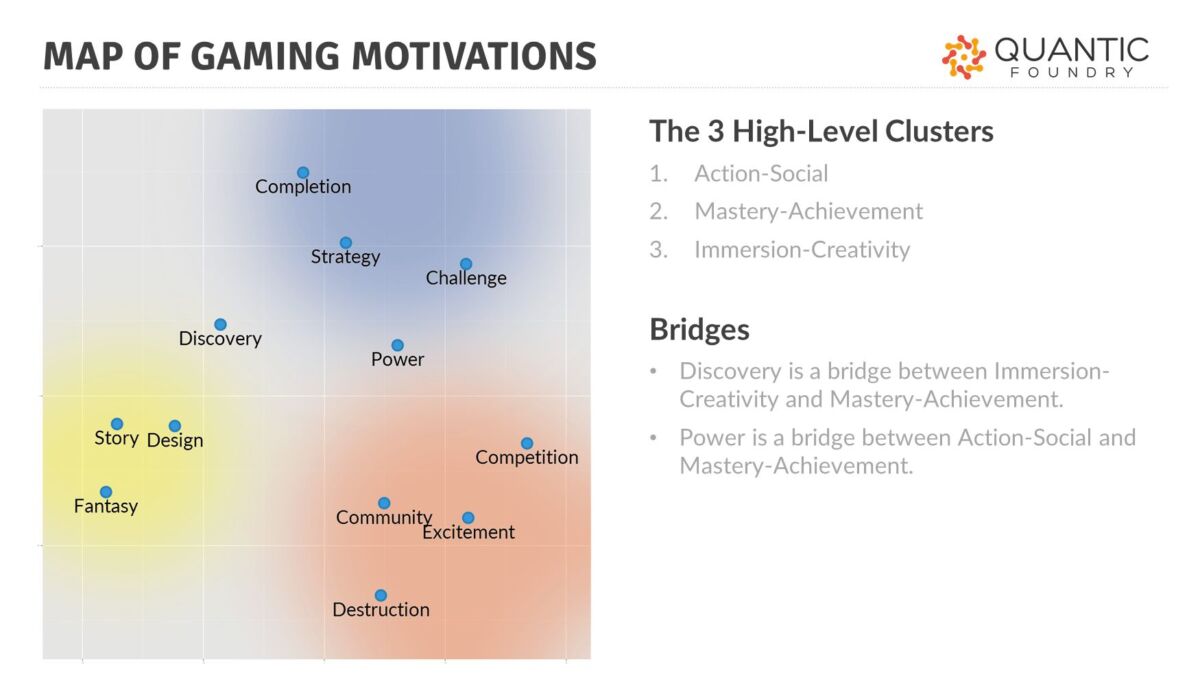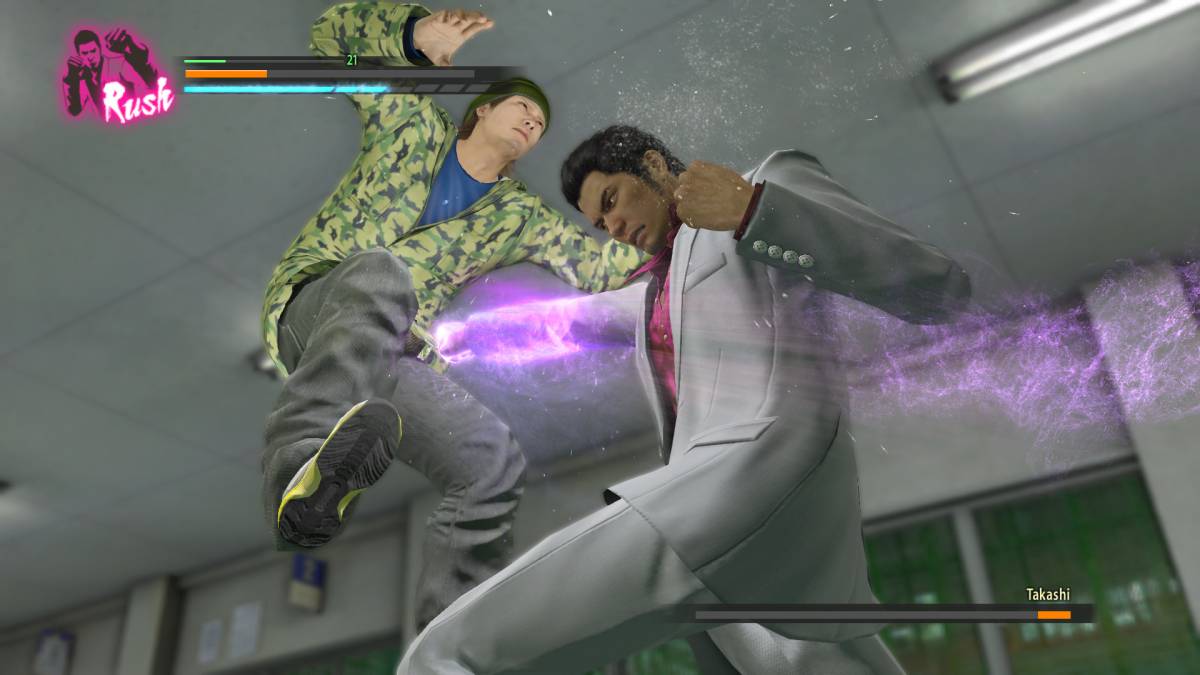Throughout a normal workday, I’m regrettably looking for reasons to just distract myself from doing anything productive, whether that be through finding new music on Spotify, browsing AITA stories on Reddit or finding some kind of lengthy video essay on YouTube. I’m also looking for reasons to talk about the Yakuza series, as it has rapidly become one of my favourite franchises of all time. Trust me, this’ll get to a point.
Recently, I watched a few videos from Daryl Talks Games, a content creator who publishes video essays that explore “the crossroads between video games, psychology and life”, and they’re incredibly interesting. One video in particular spoke about the potential link between how personality can affect the types of games we prefer, using psychological studies and data to create some interesting conclusions.
The video itself (which is worth watching in its own right but I’ll try and surmise it here) cites a study that was conducted by Quantic Foundry, where they studied 140,000 gamers about what their motivations were for playing games. Ultimately, they outlined there are 12 key reasons for playing video games, divided into six clusters: Action (destruction and excitement), Social (community and competition), Mastery (challenge and strategy), Achievement (completion and power), Immersion (fantasy and story), and Creativity (design and discovery).
At a broader level, Quantic Foundry mapped these motivations, which you can see below. The map depicts world vs player on the X axis, while cerebral vs kinetic is on the Y axis. World vs player essentially boils down to single-player or multiplayer, while cerebral vs kinetic is the difference between long, slow gameplay or fast-paced gameplay. The data showcased that those who scored high for Action are also likely to score for Social. The same is true for Mastery-Achievement and Immersion-Creativity, creating 3 larger clusters as a whole.

It’s worth noting that there are two outliers on the map: power and discovery. QF determines that power is the bridge between Action-Social and Mastery-Achievement, while discovery is the bridge between Mastery-Achievement and Immersion-Creativity. Basically, if playing as a powerful character or finding lots of cool stuff are gameplay ideas that resonate with you, you’ll be more likely to appreciate games that satiate both sides of their respective bridges.
Quantic Foundry speculates that the motivations they’ve outlined are an extension of your own personality, particularly when applied to the Big 5 Personality traits. Referred to as the OCEAN model, the Big 5 Personality traits are openness to experience, conscientiousness, extraversion, agreeableness and neuroticism. QF states that three of these personality traits fit into your gaming motivations.
Gamers involved answered two surveys about their gaming habits and their offline habits/personality, and it was found that those with a higher extraversion rating will tend to gravitate towards Action-Social motivations. Those who are open to new experiences gravitate towards Immersion-Story and there was some evidence, though more limited, that your conscientiousness is tied to Master-Achievement. These aren’t mutually exclusive either, as people can rate highly on multiple aspects. Just because you’re a high extravert doesn’t mean you won’t enjoy Immersion-Story focused games.
After giving their findings, Quantic Foundry concluded that games could be seen as a form of identity management: “In the same way that people select the news and media that reinforce their worldviews, gamers select the games that reinforce their identities. For example, gamers who are extraverted prefer more social and action-oriented games. Gamers who are more conscientious prefer games with long-term thinking and planning.”

So how the hell does Yakuza factor into all this? The franchise has exploded in popularity over the past couple of years, with many players falling in love with the outlandish series. Before now, I just chalked that up to Yakuza just being a “good-ass series that more people should play”, but having watched Daryl’s video and digested Quantic Foundry’s research, perhaps it’s because Yakuza is so broadly appealing to so many personality types.
Yakuza’s approach of throwing everything at the wall and seeing what sticks allows huge parts of the series to appeal to those three main motivation clusters: Immersion-Creativity, Achievement-Mastery and Action-Social. Whether you can resonate with just one of those, or even all of them, Yakuza has the ability to grab your attention.
For those open to new experiences, Yakuza passes the Immersion-Creativity motivation by offering game after game of compelling crime narratives that focus on different aspects each time, whether it’s a tale of revenge, or the ghost of World War 2 hanging over Japan, political intrigue, property disputes and more besides. While Yakuza looks like a simplistic beat ‘em up on the surface, the story carries so much weight that most people can easily become invested; immersed, even.
Sure, there’s not much chance for creativity, but you can creatively beat people up. That’s something, right?

Conscientious gamers will appreciate Yakuza’s commitment to Achievement-Mastery, as there’s so much to do in the game that you could easily spend hours upon hours just on the side content, whether it’s spending time at the hostess bars, playing SEGA arcade games or trying to understand the rules of Mahjong. I love Yakuza, but I’m just accepting now that I’ll never know what’s happening in Mahjong and giving up.
Not only that, but some of Yakuza’s minigames and optional content are focused on different kinds of gameplay to the usual fisticuffs, such as the Cabaret Club management found in Yakuza 0 and Kiwami 2, or the Clan Creator battles seen in Kiwami 2 and Yakuza 6: The Song of Life. These are almost brand new modes in their own right, requiring careful planning in order to succeed. They’re a perfect fit for the strategy aspect of the Achievement-Mastery cluster.
On the bridge between Immersion-Story and Achievement-Mastery is the discovery motivation, and Yakuza aces that: Substories. These micro-narratives are often some of the biggest highlights in any Yakuza game, allowing the protagonists, whether it’s Kazuma, Ichiban, Majima or the other playable characters from 4 and 5, to go on some wacky adventures. The stories are wonderful, and there’s tonnes to find, so they’re appealing to completionists to boot.

As for Action-Social, Yakuza’s gameplay has since changed with Like A Dragon. Beforehand, the beat ‘em up gameplay offered fast-paced thrills, easily fulfilling that criteria with its destructible weapons and flashy heat attacks. Like A Dragon still satiates a lot of that, but it could be argued that the turn-based JRPG gameplay would appeal to a more conscientious gamer. Either way, it’s got action by the bucket load, and the gameplay also satisfies that “power bridge”, as pretty much every Yakuza lead seemingly has the same power as a small army.
Meanwhile, with Social, the madcap nature of the Yakuza experience has created a franchise that’s so inherently memeable, allowing you to easily share clips and discussions of your favourite moments. Without playing Yakuza 0, seeing pictures of Kazuma Kiryu looking at a chicken might seem confusing, but once you’ve played it, you’ll feel like you’re part of the community, getting the inside jokes and enjoying the wild ride.
There has to be some kind of recipe to Yakuza’s success, and perhaps that recipe is found by the series appealing to the various personality types, becoming all things to all people. The fact that the games are very well made also helps. It wouldn’t matter if the core gameplay and overall game felt horrible to play, but even good games can’t appeal to some people. Yakuza managed to cast a wide net, and is largely successful in doing so. Maybe the reason for it is psychological? It’s food for thought.
READ MORE: 50 Best Open World Games of All Time
Some of the coverage you find on Cultured Vultures contains affiliate links, which provide us with small commissions based on purchases made from visiting our site. We cover gaming news, movie reviews, wrestling and much more.



